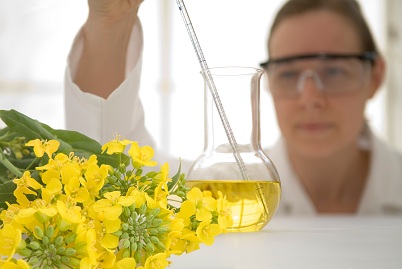European researchers improve technology for next-generation biofuels

Related topics
Agriculture & Forestry Innovation Biotechnology Bio-based Industries Bio-economy Belgium Finland France Germany Italy Netherlands Slovenia Sweden Switzerlanddate: 20/02/2014
Project: Novel high-performance enzymes and micro...
acronym: NEMO
See also: CORDIS
A more promising future source of ethanol is biomass originating from agricultural and forestry wastes. The challenge is that the energy in these sources is much more difficult to extract. Two key hurdles exist. The first is enzymes. Enzymes are used to help break down fibrous plants, but the enzymes currently in use cannot operate at very high temperatures. The second is yeast. The yeast that carries out fermentation for today’s biofuels cannot digest some of the sugars produced from fibrous plants, and can be limited by temperature as well.
The European Union (EU)-funded NEMO project took a two-step approach to address both these hurdles to industrial-scale production of cellulosic ethanol. First of all, to develop new enzymes, the research team investigated bacteria and fungi that feed on decomposing wood and leaf litter, paying special attention to those that can do this at elevated temperatures. The team selected a number of promising genes and inserted them into laboratory microbes, and then measured the activity of the enzymes the microbes produced.
The best performers needed to prove that they could be produced on a large scale. In the end, genes for thirteen different enzyme classes were successfully inserted into microbes, and a number of the enzymes were shown to be feasible for eventual commercial production. Second, to develop new yeast strains, the researchers compiled a list of over 1,000 varieties of Saccharomyces cerevisiae (similar to normal baker’s yeast). The team then selected the ones most resistant to heat, ethanol and to toxic compounds. Using genetic engineering as well as forced selection, the researchers created strains that were flexible enough to make use of all the different types of sugars produced from cellulosic feedstocks, and which also had other ideal characteristics of robust production strains.
Finally, the modified enzymes and yeast strains were tested in combination for two relevant raw materials for European industry: spruce and Arundo, a type of cane. The industrial partners involved in the NEMO project performed pilot-scale production of ethanol from each of these feedstocks, using enzymes and yeast strains tailored to each.
“For the Arundo, our pilot project proved we had a very good yeast strain. We achieved much more ethanol out of the raw material than with conventional yeast,” says Project Coordinator Merja Penttilä at the VTT Technical Research Centre of Finland.
The increased ethanol yields led to greater plant efficiency and decreased greenhouse gas emissions. In addition, the ethanol produced in this way was calculated to have a lower estimated selling price than that produced using conventional methods. “The results show we have made improvements that are beneficial in terms of sustainability, cost and efficiency,” concludes Penttilä.
The European Union (EU)-funded NEMO project took a two-step approach to address both these hurdles to industrial-scale production of cellulosic ethanol. First of all, to develop new enzymes, the research team investigated bacteria and fungi that feed on decomposing wood and leaf litter, paying special attention to those that can do this at elevated temperatures. The team selected a number of promising genes and inserted them into laboratory microbes, and then measured the activity of the enzymes the microbes produced.
The best performers needed to prove that they could be produced on a large scale. In the end, genes for thirteen different enzyme classes were successfully inserted into microbes, and a number of the enzymes were shown to be feasible for eventual commercial production. Second, to develop new yeast strains, the researchers compiled a list of over 1,000 varieties of Saccharomyces cerevisiae (similar to normal baker’s yeast). The team then selected the ones most resistant to heat, ethanol and to toxic compounds. Using genetic engineering as well as forced selection, the researchers created strains that were flexible enough to make use of all the different types of sugars produced from cellulosic feedstocks, and which also had other ideal characteristics of robust production strains.
Finally, the modified enzymes and yeast strains were tested in combination for two relevant raw materials for European industry: spruce and Arundo, a type of cane. The industrial partners involved in the NEMO project performed pilot-scale production of ethanol from each of these feedstocks, using enzymes and yeast strains tailored to each.
“For the Arundo, our pilot project proved we had a very good yeast strain. We achieved much more ethanol out of the raw material than with conventional yeast,” says Project Coordinator Merja Penttilä at the VTT Technical Research Centre of Finland.
The increased ethanol yields led to greater plant efficiency and decreased greenhouse gas emissions. In addition, the ethanol produced in this way was calculated to have a lower estimated selling price than that produced using conventional methods. “The results show we have made improvements that are beneficial in terms of sustainability, cost and efficiency,” concludes Penttilä.
